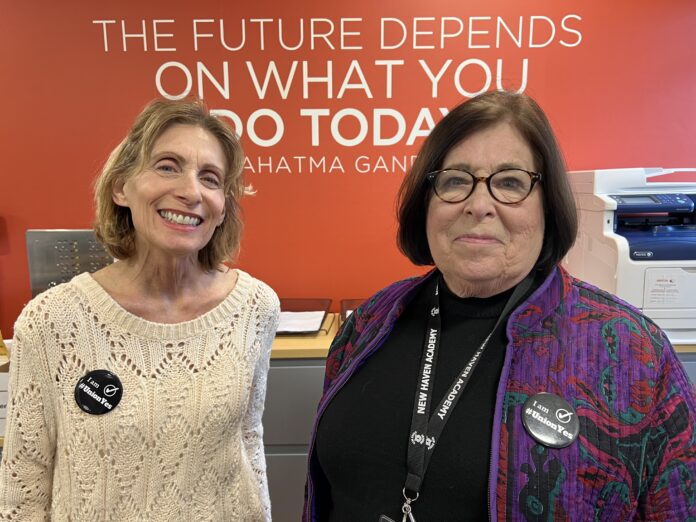Nearly 40 years ago, two provisions in the Social Security Act were created with the intent of equally treating workers who pay Social Security taxes throughout their careers and those who do not on all of their earnings. However, the provisions—the Windfall Elimination Provision (WEP) and the Government Pension Offset (GPO)—have caused nearly 2 million American workers to be denied benefits because they chose to enter public service.
We need our police, firefighters and educators, but they are being penalized for the very service they provide. To date, public employees in 15 states are affected by WEP and GPO. Members of our AFT Connecticut-affiliated New Have Federation of Teachers, Marianne Maloney (right, in photo) and Jane Roth (left) are two examples.
Maloney is a 74-year-old veteran high school math teacher, with 24 years of service in public education. Under the WEP, Maloney will lose up to half of the Social Security she paid into the system for more than 20 years before entering public service, as well as any benefits her spouse accumulated. Maloney will not complete the 37.5 years for full retirement until she is 87.
Click here for recent press analysis of the Windfall Elimination Provision (WEP).
Roth, a special education teacher has been in the classroom for 29 years. Like many women, she paused her career to care for her children and later went back to teaching. When her husband died eight years ago at age 65, Roth was eligible to collect his Social Security. If Roth stays a full-time teacher, she can continue collecting her husband’s Social Security survivor benefit. If she retires, the GPO will reduce, or as in Roth’s case, eliminate the Social Security spousal benefits because she is eligible for a pension with the state.
“I’m OK right now, but there will come a day when I’m ready to step away from teaching. I have two choices. I can retire and receive a partial pension and no Social Security, or I can work until I’m 87 and collect a full pension.”
Click here for recent reporting on the issue featuring both Roth and Maloney.
Our union members and thousands of other public employees say the provisions are unfair and need to be repealed.
For years, AFT retirees across the nation have been involved in the effort to repeal WEP and GPO. At the 2022 AFT convention in Boston, members passed a resolution that reiterated our union’s support for the effort. Now active teachers like Roth and Maloney have stepped up their involvement to end the provision as well.
“I should be able to retire with the benefits my spouse and I earned,” said Roth.
Advocates for repeal last year came close to achieving their goal with the Social Security Fairness Act (H.R. 82), a bipartisan measure that would eliminate WEP and GPO. The legislation garnered 305 co-sponsors in the U.S. House of Representatives, enough to bring the measure to the House floor for a vote.
Click here for a webinar our national union hosted last fall for retirees on the proposal.
Roth connected with the Connecticut Alliance for Retired Americans (ARA) and joined the National WEP/GPO Repeal Task Force. She rallied with the group in Washington, D.C., last May and lobbied lawmakers as well.
The bill was not recommended in the House Ways and Means Committee; as a result, it was not taken up on the House floor. Chairman Richard Neal (D-MA) acknowledged the bill’s popularity but expressed concerns about the measure’s impact on the solvency of Social Security.
But Maloney believes the cost to repeal is exaggerated. “Do the math. It’s just not that big a hit. It’s not threatening enough to deny people their earned benefits,” she said.
“We’ve already paid into Social Security. I’m not looking to get anything that isn’t mine,” Roth said. “The expectation is that it’s there for you upon retirement, but it isn’t.”
Advocates of repeal say that WEP and GPO are unfair penalties that discourage second-career candidates from applying to teach when they learn that the WEP or GPO penalty will jeopardize their earned Social Security benefits if they enter the classroom.
“The best shot we have at filling the vacancies for the ongoing teaching shortage is recruiting second-career people who can bring their education and real-life experience to the classroom, but the second they hear that they are impacting their earned Social Security, they lose interest,” says Maloney.
Click here for a series of recent reports on Connecticut’s teacher shortage.
“No one ever mentioned to me that I was reducing my Social Security,” said Maloney who believes she shouldn’t be penalized. “Active teachers don’t understand that it can happen to them.”
Roth agreed: “we need active teachers involved in this effort.”
Teachers and other public employees want to build on the momentum created in the last Congress, which saw the first committee action ever taken on a measure to repeal WEP and GPO. The bill has been reintroduced in the 118th Congress by Rep. Garret Graves (R-LA) and already has 10 bipartisan co-sponsors.
“I think we’re getting stronger and stronger. With more education and awareness of how unjust this law is, we expect a groundswell of support from everyone—active and retired. To get our message out, we must talk about our rights as citizens who have paid into the system,” said Maloney. “We are asking for equal treatment with every other working American.”
Click here for our previous update on members’ WEP/GPO repeal efforts.
Editor’s note: includes contributions by Adrienne Coles, AFT.



